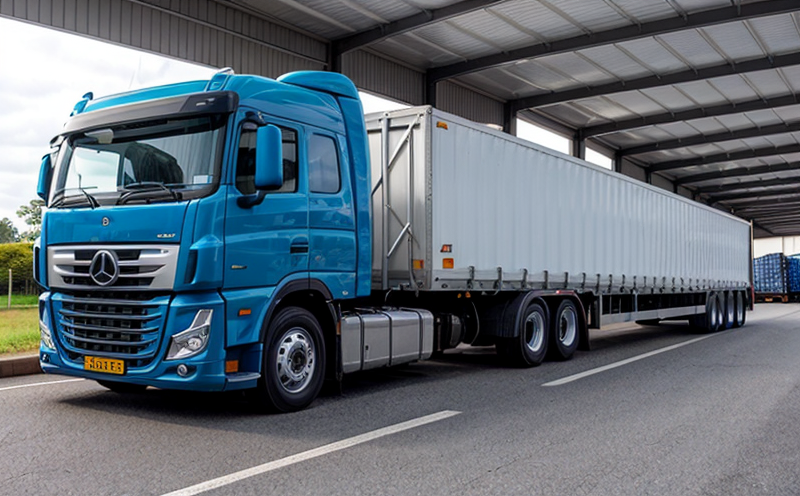ISO 3833 Vehicle Classification Compliance Testing in Trade
The ISO 3833 standard is a critical tool for ensuring that vehicles are classified correctly according to their mass and dimensions, which has significant implications for trade facilitation. This classification impacts duties, taxes, and regulations across borders. For governments and trade facilitators, accurate vehicle classification ensures fair trade practices and compliance with international standards.
Our service focuses on providing ISO 3833 compliant testing for automotive and transport goods in the context of international trade. Our team of experts ensures that vehicles are classified accurately according to their mass and dimensions using precise measurement techniques. This process is crucial for ensuring that importers, exporters, and regulatory bodies can rely on consistent and accurate classification.
The ISO 3833 standard defines a method for the determination of vehicle category based on mass and dimension parameters. This includes passenger cars, light commercial vehicles, and motorcycles. The test involves measuring the gross mass, length, width, and height of each vehicle to determine its appropriate classification under the ISO 3833 standard.
Our testing process begins with a detailed inspection of the vehicle's documentation to ensure that all necessary information is available for accurate measurement. This includes vehicle registration documents, manufacturer specifications, and any other relevant paperwork. Once this information is verified, we proceed with physical measurements using calibrated instruments.
The actual test involves precise measurement of the vehicle’s dimensions and mass. For passenger cars, the focus is on the overall length, width, height, and gross mass. For light commercial vehicles, additional considerations include the presence or absence of a load-carrying capacity, as well as other specific parameters outlined in ISO 3833. Motorcycle classification primarily involves measuring dimensions such as wheelbase, frame length, etc.
Once all measurements are taken, our team uses these data points to determine the vehicle’s category according to ISO 3833 guidelines. This categorization is then documented in a detailed report that includes all relevant test parameters and results. Our reports are designed to meet the highest standards of accuracy and reliability, ensuring they can be used by regulatory bodies worldwide.
The importance of this service cannot be overstated, especially given the increasing complexity of international trade regulations. Accurate classification not only ensures compliance with local laws but also facilitates smoother import/export processes across borders. By leveraging our expertise in ISO 3833 testing, governments and trade facilitators can ensure that their operations are both efficient and compliant.
Our team is committed to providing high-quality services tailored specifically to the needs of government agencies and international trade organizations. With years of experience in this field, we offer a comprehensive range of services designed to meet all your vehicle classification compliance testing requirements.
Why It Matters
The accurate classification of vehicles according to ISO 3833 is essential for ensuring fair and efficient trade practices. Misclassification can lead to disputes, increased costs, and delays in customs clearance processes. By adhering to this standard, governments and trade facilitators can ensure that all parties involved understand the correct classification of vehicles entering or leaving their territories.
Accurate vehicle classification also plays a crucial role in enforcing environmental regulations. For instance, heavier vehicles often require stricter emissions controls and higher fuel efficiency standards. Proper classification helps authorities enforce these requirements effectively. Additionally, it aids in managing traffic congestion by ensuring that only appropriate vehicles are allowed on certain roads or highways.
In the context of international trade, accurate vehicle classification is vital for maintaining economic stability between nations. It ensures that tariffs and duties are applied correctly based on the true nature of the imported goods. This prevents distortions in market prices and maintains equitable trading conditions among participating countries.
Benefits
- Ensures accurate vehicle classification according to ISO 3833 standards.
- Facilitates smooth import/export processes through precise measurement techniques.
- Supports compliance with international trade regulations and customs requirements.
- Reduces the risk of disputes and legal challenges related to misclassification.
- Aids in enforcing environmental protection measures such as emissions controls and fuel efficiency standards.
The benefits of ISO 3833 vehicle classification testing extend beyond just regulatory compliance; they also contribute significantly towards enhancing overall trade efficiency. By streamlining the classification process, we help reduce processing times at borders while minimizing errors that could otherwise lead to additional costs or delays.
Our service not only helps governments and trade facilitators meet their obligations but also supports broader economic goals by promoting fairer trading practices. This is achieved through meticulous adherence to internationally recognized standards like ISO 3833, which guarantees consistent and reliable results regardless of where the vehicles are being classified or traded.
Industry Applications
| Application | Description |
|---|---|
| Customs Classification | Determining the correct tariff classification for imported vehicles. |
| Environmental Compliance | Ensuring that heavier vehicles meet strict emissions and fuel efficiency standards. |
| Traffic Management | Aiding in managing traffic congestion by classifying appropriate vehicles for specific road types. |
| Regulatory Enforcement | Enforcing international trade regulations to maintain fair market conditions among participating countries. |
The application of ISO 3833 vehicle classification testing is wide-ranging and impactful. It plays a pivotal role in various sectors including customs, environmental protection agencies, traffic management departments, and regulatory enforcement bodies. By accurately classifying vehicles according to the parameters set forth by ISO 3833, these entities can effectively carry out their functions while ensuring compliance with international standards.





